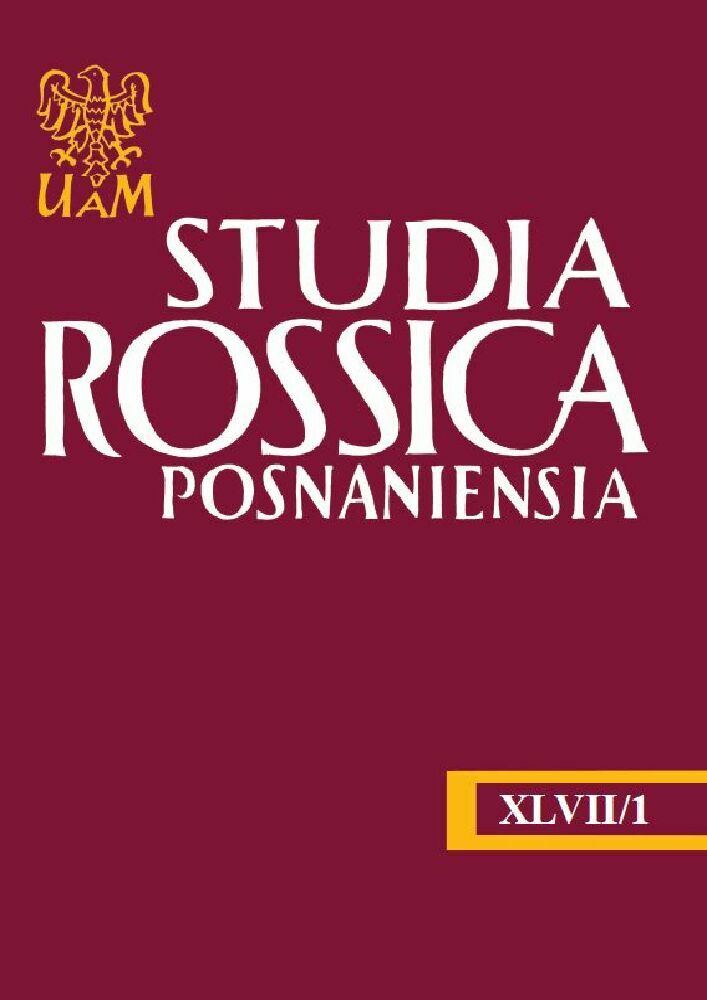Аннотация
The aim of this paper is, first of all, to discuss the linguistic sphere in Oleg Bogayev’s comedy works. We would like to pay special attention to the way the characters express themselves. The way Bogayev’s characters create reality is deeply rooted in the spirit of postmodernism, which is reflected primarily in the playwright’s bold experimentation with words, especially in the area of constructed replicas. Language saturated with humour and comical elements can be found in the plays Maria’s field (2004) and Notes of a prosecutor in love (2019). In each of these works, the mode of expression is shaped slightly differently, primarily because of the relationship between the word and the reality presented. They have been constructed according to different genre patterns. The comical and humorous character is most clearly manifested in the former at the linguistic level, while in the latter it is conditioned by the situation. On the one hand, there is humour in Bogayev’s works that can be described as good-natured and comical, directed at human existence and social problems, both as perceived by the author and the characters. On the other hand, there is satirical humour that destabilises the image of the presented world, shattering stereotypes and fixed beliefs. Humour often lurks the tragedy and absurdity of the human world, with all its weaknesses and problems.
Библиографические ссылки
Bogaev, Oleg. Marʹino pole. Pʹesa v dvuh dejstviâh. Web. 26.07.2021. https://bogaev.narod.ru/doc/marino-pole.htm.
Bogaev, Oleg. Špilʹki. Pʹesa v odnom dejstvii. Web. 26.07.2021. https://bogaev.narod.ru/doc/shpilki.htm.
Bogaev, Oleg. Tridcatʹ tri sčastʹâ. Komediâ v dvuh dejstviâh. Web. 26.07.2021. https://bogaev.narod.ru/doc/33.htm.
Bogaev, Oleg. Velikaâ kitajskaâ stena. Komediâ v dvuh aktah. Web. 10.08.2021. https://bogaev.narod.ru/doc/velikaya_kitaiskaya_stena_2011.htm.
Bogaev, Oleg. Zapiski vlûblënnogo prokurora v odnom dejstvii. Web. 20.08.2021. https://theatrelibrary.ru/authors/b/bogaev.
Dziemidok, Bohdan. O komizmie. Warszawa, Spółdzielnia Wydawnicza „Książka i Wiedza”, 1967.
Fukson, Leonid. Smeh kak sposob istolkovaniâ. Kemerovo, Kuzbassvuzizdat, 2016.
Gončarova-Grabovskaâ, Svetlana. Komediâ v russkoj dramaturgii konca XX – načala XXI veka, Moskva, Flinta, 2006.
Iŝuk-Fadeeva, Nina. „Koncept vojny: ot istorii k mifologii (Pir pobeditelej Aleksandra Solženicyna i Marʹino pole Olega Bogaeva)”. Acta Universitatis Lodziensis. Folia Litteraria Rossica. Zeszyt specjalny, 2013, s. 137–150.
Juchniewicz, Agnieszka. „Kategoria komizmu w poetyce sztuk Olega Bogajewa: problem przekroczenia granicy”. Bibliotekarz Podlaski, 49 (4), 2021, s. 325–349.
Kalmykova, Inna. „Kategoriâ komičeskogo i žanr komedii v literaturnom processe: problemy izučeniâ”. Vestnik Burâtskogo gosudarstvennogo universiteta,10 (4), 2014, s. 138–143.
Mazurek, Halina. Dramaturdzy z Jekaterynburga. „Szkoła” Nikołaja Kolady. Katowice, Wydawnictwo Uniwersytetu Śląskiego, 2007.
Mięsowska, Lidia. Gra-nie w postmodernizm. Dramaturgia rosyjska na przełomie XX i XXI wieku. Katowice, Wydawnictwo Uniwersytetu Śląskiego, 2007.
Mięsowska, Lidia. „W martwym świecie żywych przedmiotów. Obraz przestrzeni egzystencjalnej współczesnych Rosjan w twórczości Olega Bogajewa”. Antropologia kultury mieszczańskiej. Prace Interdyscyplinarne. T. IX. Red. Joanna Ławnikowska-Koper, Lucyna Rożek. Częstochowa, Wydawnictwo AJD, 2016, s. 181–192.
Musijčuk, Maria. „Ponimanie implicitnogo smysla kak osnova kreativnogo mehanizma ûmora”. Vestnik NGU. T. 5, vyp. 1, 2007. Web. 10.09.2021. https://nsu.ru>xmlui>handle>nsu.
Pavis, Patrice. Słownik terminów teatralnych. Przeł. Sławomir Świontek. Wrocław, Zakład Narodowy im. Ossolińskich, 1998.
Piłat, Walenty. „«Szkoła» Nikołaja Kolady. O dramaturgii Olega Bogajewa i Wasilija Sigariewa. Dawna a nowa Rosja: z doświadczeń transformacji ustrojowej. Red. Roman Jurkowski, Norbert Kasparak. Warszawa, Oficyna Wydawnicza ASPRA, 2002.
Rudnev, Pavel. Drama pamâti. Očerki rossijskoj dramaturgii 1950-2010-e. Moskva, Novoe literaturnoe obozrenie, 2018.
White, Hayden. „Znaczenie narracyjności dla przedstawiania rzeczywistości”. Poetyka pisarstwa historycznego. Przeł. Arkadiusz Marciniak, Marek Wilczyński. Kraków, Wydnictwo Universitas, 2000, s. 135–170.


